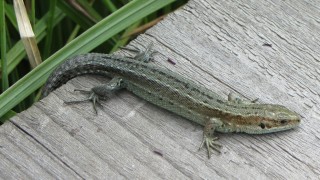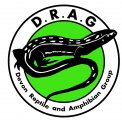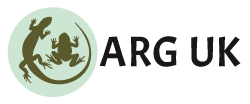About us
About Us
Welcome to the Devon Reptile and Amphibian Group (DRAG) website.

Who are we?
We are a friendly, volunteer led group who have a passion for reptiles and amphibians and a willingness to share this passion, knowledge and experience with others.
We are made up of individuals with a variety of backgrounds and interests, from those with a general interest in the natural world to experienced herpetologists, ecologists and conservationists.
What do we hope to achieve?
Here are some of the group’s key aims and objectives:
- To identify and protect important reptile and amphibian sites in the county of Devon
- To support partner groups and organisations in conserving these sites
- To better understand species distributions, populations and potential negative trends and to help mitigate or reverse those trends
- To promote conservation through education and public engagement
- To collect and submit data to Devon Biodiversity Records Centre (DBRC)
How do we achieve this?
- Through monitoring and surveying of known sites
- Through visiting potential sites of interest
- By working along with landowners and organisations in providing advice and consultations on habitat management and species monitoring
- By encouraging everyone to report sightings of reptiles and amphibians on Record Pool either using the Devon Reptile and Amphibian Group (DRAG) website (under the 'Record a sighting' tab) or by visiting https://www.recordpool.org.uk.
- By holding events and by providing resources that aim to raise awareness and educate people about these amazing animals and their habitats
- By recruiting more members
News
News
DRAG at the Deadly Day Out at River Dart Country Park
Many thanks to Jon for making the link with the BBC so DRAG could attend the event and to Kate for her enthusiastic help too.
Unfortunately, we only found out about the event at short notice so did not publicise it. If you have primary aged children, you may want to check out the webpage below for future events. Please note children come first and beware of long queues! http://www.bbc.co.uk/blogs/cbbc/livendeadly/2011/08/deadly-days-out-1.shtml
Mabel Cheung
DRAG Noticeboard May 2011
Any self respecting group would not be complete without a snappy logo, so thanks to Vicky Buller who’s creative lizard design was voted as the best by DRAG members. Well done and thanks Vicky!
DRAG membership is free! However, we are looking to charge a small fee/donation for our events to cover the costs of promotional materials, equipment or room hire for events.
A Membership Secretary is still required though Paul Forshaw has kindly volunteered to be our data base manager. Please send Paul (dragdata@pjforshaw.eclipse.co.uk) your contact details for our database to ensure you are included when new events are released, not all our events are advertised on the web.
Volunteers are always welcome to help with surveys and/or any other aspect of running DRAG and events. We want your ideas!
Mabel CheungCall for sightings
Ellie Knott
Sand Lizards at Dawlish Warren, April 2011
Since 1994 the sand lizard (or Lacerta agilis agilis to give it its scientific name) has quietly enjoyed the sand and marram tussocks of Dawlish Warren’s dunes. An open secret since the release of around 40 adults at Warren Point, it has slowly spread along the sandspit. But how far has it spread?
On Sunday 17th April a small band of DRAG members bravely turned out (in perfect weather) to help me find out. As at least half of the group hadn’t seen a sand lizard before, our first job was to find a suitably obliging individual prepared to gawped at by an over excited group of herpers!
Luckily we quickly came across a superb male, who proceeded to trot up and down in front of the assembled team (and a large loud family group) showing off his vivid green flanks and giving the impression it was going to be a walk in the park! Sadly the first part of the walk proved to be an exercise in me saying “ah there is often one here...” and “hmm perhaps it too hot...” The limited sightings of females and common lizards could have been an identification pitfall for the survey to come had it not been for the thoughtful provision of some ID pictures (thanks Stephen!).
And so to the survey. After a brief scuffle, the site was portioned up and pairs of surveyors set off to various parts of the site with instructions to record all lizards seen. I can now reveal that…….I haven’t fully collated the results but at least 11 individual sand lizards were seen, which is pretty good considering how hot is was but the middle of the day (thermometer in my car read 18 degrees centigrade).
Thank you all that took part I will produce a master map and email out to everyone. For those that saw it I guess the highlight was the pair of males fighting or the pair in courtship mode (both along a stretch of the path we’d all just walked along!).
I understand a lot more people wanted to come on the event and I hope we can run one later in year. In the mean time if you are visiting the Warren, do call into the visitor centre and one of the Rangers will point you in the right direction.
Steve Ayres, Ranger, Dawlish Warren NNR
Ebford Toad Migration, 12th March 2011
“Wednesday 9th February until Saturday 12th March. 32 days. Commitment 18:15hrs until 21:15hrs involving a minimum of 5/6 persons nightly.
It came very much of a surprise when a small number of toads were spotted on Wednesday evening the 9th February. Numbers increased for two or three nights but as usual weather conditions played their part and there followed a break of several days. Activity increased once more but yet again there were breaks and the exercise finally came to a close on Saturday 12th March by which time we had achieved creditable results. 1257 toads, 9 frogs, 27 newts, and 52 fatalities.
Thanks are due to the Ebford faithful and some very welcome newcomers who approached the exercise with good humour, commitment and patience despite the disappointment on some evenings when numbers collected were very low. Assistance was forthcoming from nearby villages of Clyst St. George, Clyst St. Mary, Woodbury followed by Exeter, Exmouth, Crediton and Honiton. Without this help we could not have coped and my grateful thanks go to these volunteers who travelled many miles to support us and so kept losses to a minimum. On occasions an hour of searching on a soulless and miserable evening provided a reward of 3 toads but on other occasions a pick-up in excess of 50 was achieved.”
Dick and Suzanne Downer
Resources
Resources
Introduction to Reptile Identification and Surveying
Adder Bites - Helpful Links
Dogs and Adders
Dogs 'n' Adders - Information Leaflet
Snakes in Gardens
Snakes are fascinating creatures and for many, finding one in the garden is a real treat and a memorable experience.
However, for many others this can be a disconcerting and even worrying situation. This can be as a result of misunderstandings often fed by negative and often inaccurate media reports and rumours. Please be assured, though, that there is no reason to worry and that these situations can be resolved fairly easily.
The vast majority of reported snake sightings in gardens turn out to be either a Grass Snake or a Slow worm (a legless lizard which resembles a snake). Both species are harmless and are best left alone.
We only have one venomous snake species, the Adder, which is rarely found in gardens unless your property is situated close to favourable habitat. Even then, the adder is a very shy animal and avoids human activity whenever it can. Again, the best course of action is to leave it alone and allow it to move off when it’s ready. The likelihood is that it is just passing through anyway.
Occasionally, DRAG gets asked about relocating snakes. For all kinds of practical reasons this isn’t something we would do and would actually be the opposite of what our group encourages which is reptile conservation.
The best recommendation we can provide is to learn as much as possible about the reptile you have seen in your garden. We will happily help you identify it and provide related advice such as understanding which features of your garden have likely attracted it in the first place.
Please don’t hesitate to get in touch and send a photo or description of the snake to devonrag@hotmail.com or to our Facebook group at http://www.facebook.com/groups/DevonARG/.
It would really help if you could record your sighting on Record Pool either using the Devon Reptile and Amphibian Group (DRAG) website (under the 'Record a sighting' tab) or by visiting https://www.recordpool.org.uk.
Please remember that reptiles are protected under UK law.
Species Guides
Species Guides
Devon's Reptiles
In the UK we have 6 native reptile species, each of which can be found in Devon.
To find out more about a particular species click on it's name which will then jump to the relevant information.
Adder Vipera berus
Grass Snake (or Barred Grass Snake) Natrix helvetica
Smooth Snake Coronella austriaca
Slow Worm Anguis fragilis
Viviparous (or Common) Lizard Zootoca vivipara
Sand Lizard Lacerta agilis
Devon's Amphibians
In the UK we have 7 native amphibian species, 6 of which can be found in Devon.
To find out more about a particular species click on it's name which will then jump to the relevant information.
Great Crested Newt (Triturus cristatus)
Smooth Newt (Lissotriton vulgaris)
Palmate Newt (Lissotriton helveticus)
Common Toad (Bufo bufo)
Natterjack Toad (Epidalea calamita)
Common Frog (Rana temporaria)
For information on the adder please click on the fact sheet link in blue or you can watch the animated video below.
Grass Snake Natrix helvetica
Tadpoles
We've all seen them right, often in large numbers early in the year in even the smallest bodies of water ..... but what are tadpoles?
Tadpoles are the larval stage in the life cycle of an amphibian. In the UK the tadpoles we most often encounter will belong to the Common frog (Rana temporaria) or Common toad (Bufo Bufo).
Amphibians go through several stages before reaching their adult form. This incredible process is known as metamorphosis. Below is a video showing in detail how this process takes place.
Membership
Membership
Why become a member?
Well, big things start in small ways and becoming a member of the Devon Reptile and Amphibian Group (DRAG) is one step you can take towards protecting the reptiles and amphibians in your local area and beyond.
Whether you’re dropping us a line by email, submitting a photo or participating as a volunteer in a reptile or amphibian survey your contribution is valued all the same. Everything we can do to keep the ‘conversation’ going is great for the reptiles and amphibians of Devon.
The more members that join the greater the potential for activity. Put simply, without members we couldn’t do what we do and it would be great to have you join us.
Membership benefits:
- · Become part of a group of like minded individuals and keep in touch via social media or email
- · Invitations to events, training and volunteering opportunities
- · A quarterly newsletter
- · Opportunities to see and work with elusive and hard to find species
- · Opportunities to learn new skills
- · Gain practical experience in conservation
- · The opportunity to have a positive, lasting impact on Devon’s wildlife
Some of the activities that you will be invited to can include talks by local experts, guided walks, bioblitzes and even species identification and survey skills training.
Opportunities for volunteering could include surveying, habitat management or helping out at nature festivals.
Have a voice in what we do.
We value your feedback and encourage it.
For example:
- · Do you have an idea for an event or training?
- · Is there a site near you that we are unaware of?
Drop us a line and let us know at devonrag@hotmail.com.
How do I join?
If you would like to become a member please send your request by email to devonrag@hotmail.com.
FAQ
- · Question: How much does membership cost?
Answer: Membership is free to join.
- · Question: How long will my membership last?
Answer: Currently, membership is on a rolling annual basis.
- · Question: Do I need special knowledge, qualifications or experience to become a member?
Answer: No. There are no prerequisites, nor is there any minimum level of commitment required.
- · Question: Can I be a member but not volunteer?
Answer: Yes. Whilst volunteering makes a big difference to what we do, we totally understand that not everyone’s circumstances allow for it.
- · Question: How do I cancel my membership?
Answer: You can cancel your membership at any time by sending your request to devonrag@hotmail.com.
Photo gallery
Photo Gallery
Contact us
Contact Us
If you want to join DRAG and our email group, or have a general query, please contact a member of DRAG admin:
Please be patient with us, this email address is not checked every day!
Upcoming Events
Upcoming events will be listed here.
Latest News
- A tale of six lizards
25/07/2021 1:49 pm - Upcoming Talk
15/02/2016 3:22 pm - Reptile Training Oppourtunity
28/04/2014 9:40 am - DRAG great crested newt training courses delivers the goods
23/05/2013 10:46 pm - Sand lizard summary and pics
09/05/2013 10:23 pm
© Devon Reptile & Amphibian Group (DRAG)
Website hits: 71198
View All | Find out how to get a mini-website for your ARG
© ARG UK Local Groups mini-websites 2025
Wind powered websites by Aye-aye Design.

